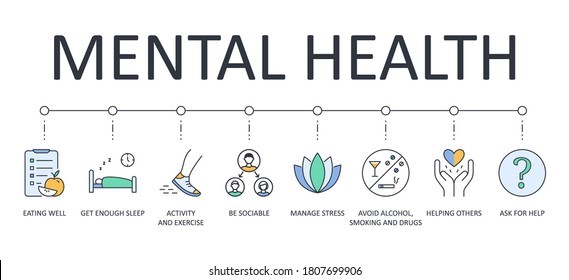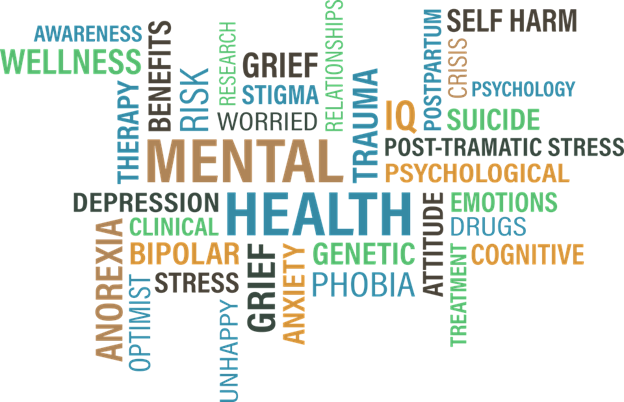
Prioritizing your mental health is essential to the overall state of your body, relationships and emotional health. Mental health includes emotional, psychological and social well-being. According to the Centers for Disease Control and Prevention, it impacts how you think, feel and act, and it determines how you might handle stress or relate to others. Your mental health can change over time and can be influenced by life situations like job stress, loss of a loved one or changes in physical health.
Mental health is the cornerstone of relationships as well as physical and emotional health. The past two years have highlighted the importance of taking care of yourself because if you don’t, your mind, body, and spiritual health can suffer. For example, at some point, maybe after a death of a loved one, you can experience depression. Your depression can affect how you interact with, think about, or feel towards people. Everyone can struggle with their emotional health. However, when left untreated, feelings like depression or anxiety can increase and disrupt your life. Mental health disorders can hurt or harm your relationships with your friends, family, or co-workers. Depression or anxiety are two of the most diagnosed mental health disorders. Depression can affect you because you can:
Lose interest in activities you once enjoyed
Stop socializing with friends or family
Have thoughts of hurting yourself
Anxiety disorders can disrupt your life because they can:
Create a feeling of danger or doom
Decrease your ability to concentrate
Lead you to avoid situations or people who can trigger your anxiety
The various symptoms of any mental health disorder can also adversely affect your physical health. Over the years, several research studies concluded that mental health issues could contribute to diseases like diabetes, cancer, and heart issues.
You may say or think your mental health is a priority, but is it? Take a week to journal your daily habits. After the week is over, review your week and see how often you incorporate self-care into your daily routines. Whether your self-care is routine, sporadic, or non-existent, there are ways to make your mental health a priority.
Prioritizing your mental health is essential to the overall state of your body, relationships and emotional health. It may seem an inconvenience to schedule a little time to look after yourself. However, the benefits far outweigh the bother.
Here are some ways to build time into your day to look after your mind:
Learn to say no
If you’re asked to commit to something that feels like more than you can give, don’t be afraid to say no. Overstretching yourself for work, friends or family is detrimental to your wellbeing. It’s ok to put yourself first.

Connect with others
Socializing is positive and healthy, so even if you don’t feel like it, prioritize seeing friends. If time is short, make sure to keep in touch by phone or text. Research shows that socializing is as important for humans as sleep and nutrition! Schedule in regular fun activities, be it with the kids or without. Getting out of the house and enjoying yourself helps boost your happiness levels. It needn’t cost the earth either- even a game of bowling or a free tactivity will do the trick. Meeting up with friends can be low cost, and ticks the ‘socializing’ and ‘fun’ boxes in one go. Make sure you plan ahead with things to look forward to- it makes a big difference to your stress levels.
Give back
Spending some of your spare time helping the community has significant benefits for your mental health. Volunteer your time and energy. Making others feel good makes us feel good too. You’ll feel good about doing something tangible to help someone in need — and it’s a great way to meet new people.

Get out in nature
Nature has incredible therapeutic effects on the brain. All you need is to head to the nearest forest, beauty spot, nature reserve or park and enjoy a walk or a run. You could also try gardening, a hobby which roots you in nature and is known to reduce stress and anxiety.

Get exercise
Exercise is an essential part of taking care of yourself. Not only can it bring you joy, but it’s time when your mind can wander, process, or heal.
It can all feel like too much hassle, but the way you feel after exercise can’t be replaced. Not only does exercise help to release stress, but it also gets the feel-good endorphins pumping in your brain.
Exercise can be as simple as going for a daily walk, or as involved as joining a local class. There is an activity for everyone.
Eat to beat stress
You might feel like cracking open a giant bag of crisps or sweets in front of the TV, but hold off; what you eat has a dramatic effect on the brain. Choose protein to help regulate your mood, and fruits and vegetables contain the vitamins you need to stay well. Avoiding sugar helps lessen anxiety, too.
Value yourself
Treat yourself with kindness and respect,
and avoid self-criticism. Make time for your hobbies and favorite projects, or broaden your horizons. Do a daily crossword puzzle, plant a garden, take dance lessons, learn to play an instrument or become fluent in another language.

Take care of your body
Taking care of yourself physically can improve your mental health. Be sure to:
Eat nutritious meals
Avoid smoking and vaping
Drink plenty of water
Exercise
Get enough sleep
Surround yourself with good people
People with strong family or social connections are generally healthier than those who lack a support network. Make plans with supportive family members and friends, or seek out activities where you can meet new people, such as a club, class or support group.
Learn how to deal with stress
Like it or not, stress is a part of life.
Practice good coping skills: Try One Minute Stress Strategies, do yoga,
exercise, take a nature walk, play with your pet or try journal writing as a
stress reducer. Try meditating, Mindfulness and/or prayer. Relaxation exercises and prayer can improve your state of mind and outlook on life. In fact,
research shows that meditation may help you feel calm and enhance the effects of therapy. Activities like yoga or breath-work can help decrease negative thoughts or feelings because they require you to focus on the connection between your mind and body. Also, remember to smile and see the humor in life. Research shows that laughter can boost your immune system, ease pain, relax your body and reduce stress.
Set realistic goals
Decide what you want to achieve academically, professionally and personally, and write down the steps you need to realize your goals. Aim high, but be realistic and don’t over-schedule.
You’ll enjoy a tremendous sense of accomplishment and self-worth as you progress toward your goal.
Break up the monotony
Although our routines make us more efficient and enhance our feelings of security and safety, a little change of pace can perk up a tedious schedule. Alter your jogging route, plan a road-trip, take a walk in a different park, hang some new pictures or try a new restaurant.
Avoid alcohol and other drugs
Keep alcohol use to a minimum and avoid other drugs. Sometimes people use alcohol and other drugs to “self-medicate” but in reality, alcohol and other drugs only aggravate problems.
Get help when you need it
Seeking help is a sign of strength not a weakness. And it is important to remember that treatment is effective. People who get appropriate care can recover from mental illness and addiction and lead full, rewarding lives.
Prioritizing your mental health is essential to your overall well-being. Your body, mind, and spirit rely on your mental health. If you can’t take care of yourself, it affects your relationships and physical health. Sometimes knowing how to make yourself a priority is challenging. Whatever you decide will help you prioritize maintaining good mental health, make sure you include it in your daily routine. The amount of time you spend isn’t what matters. What matters is that you make yourself a priority.







